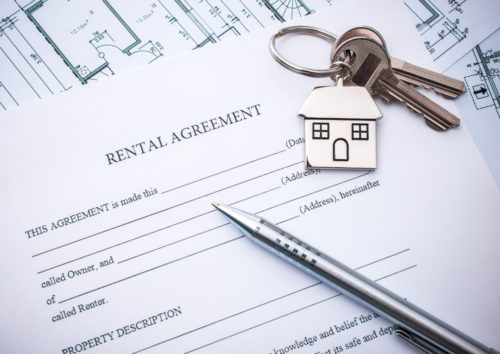Renting an apartment is a lot like having debt. You have monthly payments to make, and a deadline to make them in. If you miss a payment, you face an almost immediate risk of fees, penalties, and interest charges. Continue to miss payments or fail to pay altogether, and you might be sent to collections. Your landlord definitely keeps a record of every transaction made from you to them. That record shows every payment you’ve made, whether it was on time, and if it was late, by how much.
What matters to your landlord has a lot in common with what shows up on your credit report. In fact, even though most landlords will run a credit check before taking you on as a tenant, it isn’t exactly the norm for those same landlords to report your payments, or for your rental history to even show up on a credit report. Unfortunately, renting an apartment and paying your rent is not always treated the same as having and paying off debt. You may be a model tenant, but that doesn’t mean you have a good credit score — or any credit history at all.
Table of Contents
What Is In My Rental History vs Credit History?
How is it possible to have a good rental history, but no credit history? While having a credit score can affect your ability to rent a house or apartment, many landlords will care much more about your rental history. Subsequently, it can be worthwhile to understand the difference, and what goes into each.
Rental History and Background Checks
While your credit history is primarily a record of debts, payments, and the relative risk lenders face in letting you borrow money, your rental history is a combination of financial and social history. Most landlords will at least want to see your credit score, if not a more detailed report, before they rent to you. It is equally common for them to run a background check, to see if you have any criminal history or other risky items in your past they should know about. You might hear the term “rental history check” used interchangeably with “background check,” because that is what property managers are really looking for.
So, what all is in your rental history?
Your landlord keeps a record of every payment you make to them. They will keep a running log of payments that are made on time, payments that are late (within a grace period), and payments that are seriously overdue. When you sign a lease with your landlord, they will lay out everything you need to know regarding when payments are due (typically on the 1st of each month), if there is a grace period for late payments, and when a late payment is considered delinquent. Tip: It isn’t uncommon for there to be some form of discount on rent if it is paid early, or by direct deposit each month, so it can pay to ask about this.
This all probably sounds a lot like your credit history. However, your landlord is likely keep track of more than just your payment history.
When you sign a lease, you also probably have to pay a security deposit. If you cause damage to your apartment, or leave it so filthy your landlord has to have it professionally cleaned, that will likely cost you your security deposit. You can bet your landlord makes a note of that. Likewise, if you are a nuisance to neighbors, cause your landlord to receive noise complaints, or have the police called to your apartment for any reason, that will also earn you some negative feedback on your rental history.
Rent Payment History
Part of the reason rental history is distinct, is because landlords are often more forgiving than other lenders when it comes to late payments.
It’s common for landlords to allow a grace period of about five days to get your rent payment submitted. Some places may offer more than five days, even up until halfway through the month with only a small penalty or a set fee, but again, each landlord is different and will have varying policies. Make sure that you clearly understand your lease and if there are late fees associated with making a late payment.
Now, a late payment will be recorded as such under your landlord’s records, but depending on how late it is, it may or may not actually affect your credit score. Sadly, payments that are made on time do not always get reported onto your credit. However, they will affect your ability to receive a sparkling recommendation from your current landlord when/if you decide to move into a new apartment or home, which is just as important as something that impacts your credit score.
How Does My Rental History Affect My Credit?
You can’t guarantee that on-time payments get reported to the credit bureaus. Even though landlords often rely on credit scores to make decisions about who to rent to, they aren’t as reliable when it comes to reporting on their tenants. That means a positive rental history won’t necessarily help you build credit.
The same doesn’t hold for negative items on your credit report. If a late payment has passed the grace period for late payments, you can assume it will end up hurting your credit score. Your landlord needs to collect the money for your rent, so usually they will do so by trying to contact you and sending you reminders. If they still don’t get the funds owed to them, your total amount due will likely be sent to a collection agency — here is where your credit score is definitely affected.
If your landlord has to resort to a collection agency in order to acquire the funds due, the collection agency will then take over your account. You’ll receive calls and possibly emails and snail mail from them trying to work out how to get the rent paid. Depending on the circumstances, your credit score could be lowered immediately after your account was sent to collections. In other cases, the collection agency will warn you that your credit score will be affected only if they don’t hear from you by a certain time. It’s important to listen to their instructions and follow them, for the sake of your credit score.
Reporting Rent Payments to the Credit Bureaus
If this is all sounding one-sided and unfair, don’t worry: you aren’t alone in thinking so. The good news is that, while renting an apartment historically hasn’t done much for building credit, that is beginning to change.
For one thing, VantageScore, an alternative scoring model to the more popular FICO score, does try to take rental history into account. The idea is that for many people just starting out on their own, renting an apartment may be the first major financial responsibility they take on. Even though it isn’t exactly the same as having debt, it can still paint a pretty accurate picture of how likely they are to make payments on time, and keep their income balanced with their financial obligations. Credit scores are ultimately just a measure of risk, so having a credit score built on renting apartments can be more helpful than having no evidence to go on.
Getting Rent Included in Credit Reports
There has been a trend for several years, especially since the housing crisis in 2008, of more people choosing to rent instead of buying homes. Millennials in particular reflect this movement. Because mortgage payments are traditionally such a solid foundation for credit reporting and scores, this means the credit bureaus are missing out on a lot of valuable information on potential borrowers and consumers.
As a result, the credit bureaus are also taking steps to become more active in soliciting rent payment information from landlords and property management companies. Because the credit bureaus are so often providing credit reports on potential tenants, it is a natural fit for them to also record information they receive from these same customers.
TransUnion uses a platform it calls ResidentCredit to try to make up the gap in rent reporting, and help landlords and renters alike benefit from the accurate tracking of rental payment history. Experian has a similar system called RentBureau. This blends credit checks, rental history checks, and requests for rent payment information into one platform, so more landlords and property management companies will start sharing information as much as they ask for information.
For now, these services are often limited to companies that rent to a certain number of tenants, or which manage a larger number of properties, but it does show that the credit bureaus recognize the importance of rental history, and are trying to incorporate that information into credit reports.
How Will This Affect Me?
It is important to monitor your credit and take steps to build a good credit history, whether you are renting or thinking about buying a home. Just because your rental history isn’t being captured in your credit score currently doesn’t mean it isn’t important to take care of both.
Multiple late payments and/or an eviction on your rental history doesn’t look very good to your future landlords. If you’re evicted from one apartment due to non-payment, your landlord will likely offer a less than satisfactory recommendation to the next apartment you apply for. Not to mention, your new prospective landlord will be able to see your payment history and/or reason for eviction. All it takes is one serious non-payment issue or an eviction to mess up an otherwise beautiful rental history. As a tenant, it can be difficult or more expensive to rent an apartment with bad credit. Your rental history can sometimes help make up for having little or no credit history, so don’t expect to get away with being a bad neighbor or a sloppy tenant.
Having a lowered credit score can affect you in several other ways. If you ever decide to open up a new line of credit, you might have a hard time getting approved. This means anything from credit cards, to auto loans, home loans and more. Of course, with good credit habits you can fix a small ding to your credit score, but if you ignore a payment that has been sent to collections or have multiple collections issues on your credit history, it could take a long time to fix larger mistakes like that. You could be feeling the effects of them years later when you’re ready to dive into a new and worthy investment opportunity.
What Can I Do About it?
If you think there is a strong possibility that you won’t be able to pay your rent on time, you need to contact your landlord immediately. They may be able to work with you and give you a little bit more time without sending you to collections, which is great news for your credit score. It will also likely help your relationship with your landlord if you’re honest with them about the situation. If they don’t know anything about your circumstances and can’t reach you, they might have no other choice, but to send it to collections. A little communication can clear up the whole situation and save yourself a good reference for the future.
Let’s say you’re beyond the point of a late payment. Once you’ve been sent to collections, it’s important to not ignore their attempts at contacting you. Often times, they just want to work with you and figure out a way to get the total balance paid. You may have some extra taxes and fees that are added to your late payment, but you might be able to get them to work on a split payment or a payment plan. Addressing the issue as quickly as possible is the best way to save your credit score from serious harm. The longer that you ignore it, the worse it will appear on your credit history.
No matter what situation you’re in, you can always improve your credit score. Just know that repairing bad credit takes time and hard work. If you’re dedicated to improving your credit score, adopting sound credit tactics early on is what will stay with you for the rest of your life. Everyone makes mistakes, so don’t worry about that, it’s best to come at any financial issue head on and try to work something out. Not to mention, with good credit habits going forward, you can bring your credit score back up to where it was (and maybe even higher!) before any mistakes were made.
Need to increase your credit score to impress a landlord? Visit our credit score resource and learning center for tips and guides.
Image Source: https://depositphotos.com/




